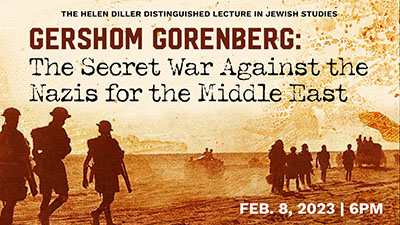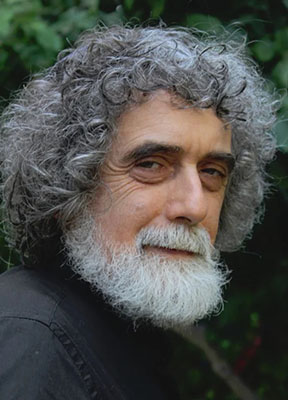Campus News
Uncovering the secret war against the Nazis in the Middle East
In his book talk on Wednesday, February 8 at UCSC, Gershom Gorenberg (Kresge ’76, Religious Studies) will reveal the espionage affair that led to the British victory against Rommel at El Alamein – turning the tide of the war and preventing the mass murder of the Jews of Egypt, Palestine and the rest of the Middle East.


An Axis army under the fearsome Nazi Field Marshal Erwin Rommel arrived in the Middle East in 1941. By 1942, Rommel was on the brink of conquering the region.
But British forces blocked Rommel’s advance in the summer of 1942 – with the secret, strategic help of brilliant Allied codebreakers.
Historian, Washington Post columnist and UCSC alumnus Gershom Gorenberg, an American-born Israeli journalist, will share this previously untold aspect of World War II when he speaks about his latest book War of Shadows at a talk scheduled for 6 p.m., Wednesday, February 8, at the Hay Barn near the base of campus.
Gorenberg’s talk is this year’s Helen Diller Distinguished Lecture in Jewish Studies.
In his book talk, Gorenberg will reveal the espionage affair that led to the British victory against Rommel at El Alamein – turning the tide of the war and preventing the mass murder of the Jews of Egypt, Palestine and the rest of the Middle East.
“One human lifetime ago, the battle for the Middle East was one of the critical fronts of World War II,” Gorenberg writes in the new book. “Much of what determined the outcome of the battle, and therefore of the war as a whole, remained secret. Quickly shaped legends turned into accepted memory. Today even that misleading memory is fading. Yet what happened then shaped the Middle East, and continues to shape it today.”
Gorenberg’s work is the result of determined research, sleuthing and interviews,. He pored through files at the British National Archives, and examined formerly classified papers.
The fact-gathering process was so complicated that “I could write a second book” narrating what it took to put War Of Shadows together, Gorenberg said on Friday.
In his detailed author’s note for the book, Gorenberg wrote that War Of Shadows required “a journey that lasted years – to Rome, to Cairo, and the sands of El Alemein, to London and the once-secret huts of Bletchley Park, to archives in places from Tel Aviv to Palo Alto …”
He conducted lengthy interviews “(in) the homes of the children and grandchildren of people whose names have been forgotten though they changed the direction of history,” Gorenberg wrote.
Some of the papers he examined had been classified for the previous 70 years.
Gorenberg, who describes himself as “a left-wing, skeptical Orthodox Zionist Jew,” is also the author of The Accidental Empire: Israel and the Birth of the Settlements, 1967-1977, and The End of Days: Fundamentalism and the Struggle for the Temple Mount, which portrays the role of religious radicalism in the Mideast conflict.
He co-authored The Jerusalem Report’s 1996 biography of Yitzhak Rabin, Shalom Friend, winner of the National Jewish Book Award.
A frequent guest on news programs, Gorenberg has appeared on Sixty Minutes, Nightline, Dateline, Fresh Air, and on CNN and the BBC, and is former associate editor of The Jerusalem Report. He has contributed to The Atlantic Monthly, The New York Times Magazine, The New Republic, Mother Jones and Ha’aretz.
He has lectured at the Council on Foreign Relations, the Carnegie Council, the Washington Institute for Near East Policy, the Middle East Institute, the Wexner Graduate Fellowship, and for universities, congregations and other organizations seeking a nuanced view of politics, Mideast affairs and religion.
After graduating from UCSC, Gorenberg moved to Israel in 1977 and earned an MA in education at the Hebrew University.
He lives in Jerusalem, except when he is teaching at Columbia University. He is an active member of Kehillat Yedidya, the pioneering progressive Orthodox congregation in South Jerusalem.
Event logistics
Bicycling, car pooling, ridesharing, and public transportation are encouraged as parking is limited.
If you drive to the event, please plan to park in UCSC Lot #115 or 116. To reach these lots, proceed through the main entrance to campus, continue up the hill from the information kiosk on Coolidge, then turn right at the Ranch View/Carriage House Road stoplight into the Carriage House/Campus Facilities parking lot.
The Hay Barn is a 5-minute walk across the street from the parking lot. There will be directional signage to help you get to the correct parking lot and Barn entrances.
Overflow parking will be available at lot 122.
Register here for this free event. Advance reservations are strongly encouraged because seating at the Hay Barn is limited.
The event is presented by the Center for Jewish Studies, and made possible by the Helen and Sanford Diller Family Endowment for Jewish Studies. The Humanities Institute at UCSC is co-sponsoring the talk.